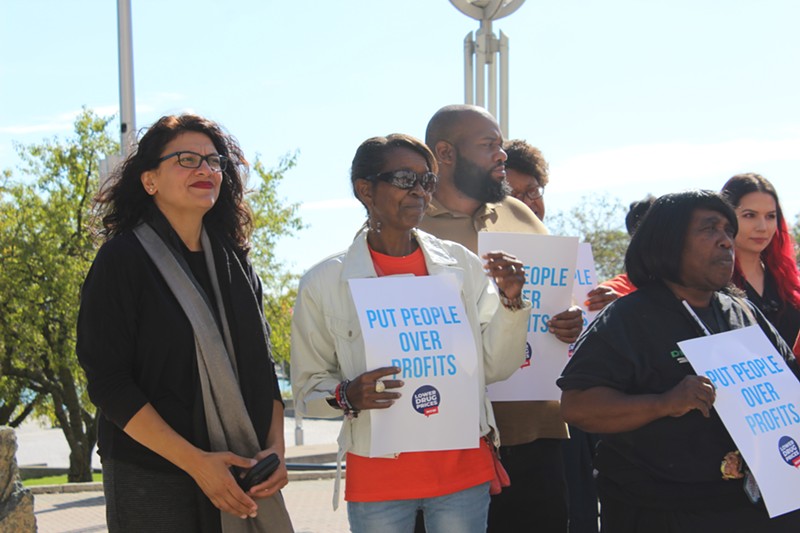Tlaib: Hotel bailout will only reward bad behavior, not help workers
[
{
"name": "GPT - Leaderboard - Inline - Content",
"component": "35519556",
"insertPoint": "5th",
"startingPoint": "3",
"requiredCountToDisplay": "3",
"maxInsertions": 100
}
]
Here we go again. The wealthy are weaseling their way into having the government bail them out while millions of Americans are left facing unemployment and an economic collapse.
Months after Treasury Secretary Steve Mnuchin failed to get them the bailout they wanted, real estate and hotel industry magnates are on the brink of successfully bullying Congress into bailing them out — not so they can provide paychecks or healthcare benefits to the hundreds of thousands of laid-off hotel workers, but so they can pay off the bank debts they accumulated prior to the pandemic.
Any sweetheart hotel bailout deal would really only be for Trump-tied real estate and hotel industry folks and their real estate trusts and private equity companies that own most hotels in the United States. It’d also be the epitome of rewarding bad behavior. Even after 10 years of strong revenue growth, many hotel owners do not have a rainy-day fund. That’s because instead of bothering to save for rainy days such as the ones all of us have faced throughout this pandemic, they distributed profits to investors every single quarter. Worse, some even piled on new debt by refinancing every time real estate values rose. So what about their employees who had no say in their employer’s careless financial decisions? If their bosses have their way, they’ll be left by the wayside.
To be clear, although there are small hotel owners in dire straits, this bailout would not go to benefit most mom-and-pop small businesses like them — just as the Paycheck Protection Program in the last pandemic relief package didn’t. Indeed, the primary beneficiaries of this bailout would be large, very wealthy business people who recklessly borrowed heavily in the good years, taking advantage of a risky, yet inexpensive debt called commercial mortgage-backed securities (CMBS).
In my home state of Michigan alone, 40 percent of the debt in special servicing is owned by large real estate companies. Half of that alone is from a portfolio of limited-service suburban hotels that was, until a few days ago, owned by Colony Capital, Tom Barrack’s $50 billion private equity firm. Ironically, Colony acquired them on the cheap from borrowers who got in trouble during the 2008 recession. As I said before: Here we go again — just a few years later.
Across the country, the COVID-19 pandemic has cost hundreds of thousands of hotel workers — mostly Brown and Black and female — their jobs and, along with them in some cases, life-saving health care. Seventy percent of them had already been laid off by the end of March and before Congress passed the CARES Act, the first pandemic relief package (more on that later). As the pandemic continues to ravage our country, countless more workers face terrifying insecurity — and so far, the conversation around a potential bailout for their employers has left them with more questions than answers. Will they still have a job? Will they be able to pay their rent next month? What will they do if they or a family member gets sick?
That last question carries a whole new weight in a post-COVID-19 world. The small minority of hotel workers who have been asked to return to their jobs do so confronting a new, potentially grave threat: the risk of exposure to the deadly virus in their workplaces, where guests sometimes roam maskless and management is often reluctant to enforce their own (inadequate) safety rules for fear of retribution by an offended guest. The gross lack of consideration for our struggling hotel workers is endless.
What makes the dire straits these real estate and hotel magnates have placed themselves and their employees in all the more offensive is that some of this hardship and misery could have been prevented if they had only made proper use of the first round of relief funding Congress provided through the CARES Act. For example, rather than discontinuing employer-sponsored health care for those who had it, hotel owners or operators could’ve taken advantage of the Employee Retention Tax Credit. That would have provided them with an immediate tax rebate to pay for 50% of the health care costs of laid-off workers who need it now more than ever. Instead, most hotels left that money on the table, stripped workers of their health coverage, and set about lobbying for another bailout — one that would subsidize their bank debts, not their workers.
Hotel workers have been far from their bosses’ minds since the start of the pandemic. When hotel owners successfully lobbied 100 members of Congress to send a letter to Secretary Mnuchin urging him to help hotels whose mortgages had been packaged into commercial mortgage-backed securities this summer, there was no mention of what it would mean for their current or laid-off workers. In a disgusting display of quid pro quo, though, the American Hotel & Lodging Association’s PAC cut $5,000 checks days later for some members who’d signed that letter. Imagine what a difference those $5,000 checks would’ve made in the life of one of their laid-off hotel workers?
Requests that would explicitly make a difference in the lives of their workers were once again missing in their letter to the Senate Banking Committee in July. “We believe that the MSLP could properly be used to provide much-needed relief for commercial properties,” it read, before going on to ask for expanded eligibility for Small Business loans for businesses of any size (convenient) and to lift the ban on Commercial Real Estate (CRE) loan borrowers from — you guessed it — acquiring more debt (their favorite pastime).
The answer to the request for a hotel bailout from Congress must be a resounding no. Instead, we must come up with emergency programs that both stabilize small businesses and ensure that their everyday American employees can survive the deepening economic crisis this pandemic has plunged us into. That should mean a relief package that addresses working Americans’ urgent needs: direct and recurring relief payments, secure housing, affordable health care, and meaningful safeguards mandated at places of work.
Rashida Tlaib serves as the U.S. Representative for Michigan's 13th congressional district.
Stay on top of Detroit news and views. Sign up for our weekly issue newsletter delivered each Wednesday.







